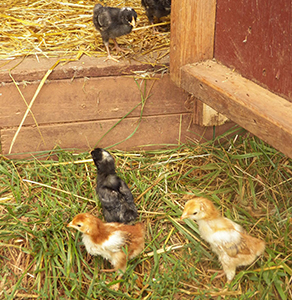After learning that an estimated 95% of egg-laying hens on factory farms are intensively confined in tiny wire cages so small, they can’t even spread their wings, many well-intentioned urban dwellers are flocking to the idea of raising backyard chickens as a more humane alternative. Unfortunately, this trend which has gained momentum largely from the sustainable and locavore movements, is not all it’s cracked up to be, especially for the birds.
From hatchery hell to health threats, here’s why choosing egg-free options is still the best and easiest way to protect the planet – and animals:
Hatchery Hell: Most chicks sold for people to raise in backyard coops come from the same hatcheries that supply factory farms — the same hatcheries that discard unwanted male chicks (since they can’t lay eggs) by grinding, gassing, or suffocating. In 2009, a Compassion Over Killing undercover investigation documented shocking abuse forced upon newly hatched chicks at Cal-Cruz Hatcheries, including hatchlings dumped down the egg shell disposal chute, sick or severely injured birds left to suffer for hours, birds entangled in machinery, and more. Although the cruelty inflicted on the chicks documented by the COK investigator were destined for meat farms, chicks born at laying hen hatcheries suffer similar conditions.
Treated Like Inanimate Objects: These chicks you might find in your local stores were probably packed in cardboard boxes and shipped via mail. And it’s not uncommon for a few additional chicks to be tossed in the boxes as “filler” since not all are expected to survive the journey. Just this week, Poplar Spring Animal Sanctuary in Maryland took in some chicks rescued from the Animal Welfare League of Arlington — the birds were shipped via mail, but thrown away into the middle of a street after the recipient decided they didn’t want the birds anymore. These 24 baby birds were found dirty and dehydrated, and many had to be euthanized. Fortunately, five of the survivors (featured in the photo above) are now enjoying a better life at a sanctuary, but not all chicks are so lucky to end up in caring hands.
Like Cats and Dogs, Birds Need Care: It’s important to know how to properly care for chickens and to understand their specific needs. It’s hard enough to locate a city vet equipped to treat a chicken for sickness or injury, and when they can be found, the prices may be higher than expected. The birds may also be messier and noisier than anticipated, and you might even end up with a rooster since chicks can be difficult to sex. Will your neighbors complain? And what will you do if the chicken feed starts to attract rats or mice?
Spreaders of Disease: In the summer of 2011, backyard chickens sickened 71 people — more than half of them under the age of five. More recently, NPR released a story about a single mail-order hatchery which sold chicks for backyard coops that was linked to a salmonella outbreak among 195 people in 27 states.
Life after Laying: The lifespan of a hen can be 7-20 years, but their laying cycle often slows down significantly after the first couple of years. An NBC News article succinctly titled “Backyard chickens dumped at shelters when hipsters can’t cope, critics say,” noted that when people realize that chickens require so much care — care they are especially unwilling to provide egg production wanes — the birds are dropped off at already overburdened city shelters and sanctuaries. Since chickens are not as easy to adopt out as say, cats and dogs, most chickens who end up at shelters are euthanized. Some backyard farmers even send their chickens to butchers, or worse, attempt to slaughter the birds themselves.
These bright and sensitive birds deserve better — and the best way to can protect them is to simply to choose egg-free foods. Thankfully, there are a carton of ways to go egg-free: from savory and sweet animal-friendly recipes to new companies shelling out innovative products, it’s easier than ever to crack the cruelty.

